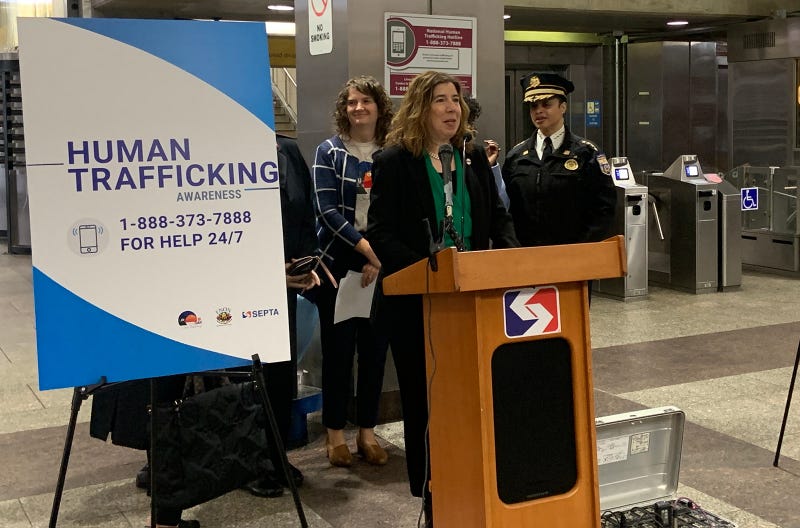
PHILADELPHIA (KYW Newsradio) — SEPTA is taking a stand against human trafficking. The transit agency has added signs throughout its system promoting the National Human Trafficking Hotline, and is educating employees on how to detect and stop trafficking.
“These signs promoting the human trafficking hotline are now a part of SEPTA’s standard sign package,” said SEPTA General Manager Leslie Richards on Tuesday at Frankford Transportation Center.
“In addition to signage, every frontline employee is trained to recognize the characteristics of trafficking,” she said, “and transit police officers attend the Villanova Law Institute to learn how to investigate these crimes.”
According to the hotline, Pennsylvania ranks ninth nationwide in reported human trafficking cases. Acting SEPTA Police Chief Charles Lawson adds that there have been more than 1,000 cases reported in the state over the last five years.
Lawson said that partnerships, campaigns and knowing what to look for can help fight this crime.
“At SEPTA, all of our officers have been trained in human trafficking intervention, specifically in what to look for in the behavior of both the trafficker and the victim. and how we coordinate with our federal state and local partners,” he said.
“You should know that Black and brown women go missing every day,” said Dr. Ellyn Jo Waller, founder of one such partner, She’s My Sister Anti-Human Trafficking Ministry at Enon Tabernacle Baptist Church.
“Human trafficking happens in places where you wouldn’t even begin to imagine. It happens to people that you wouldn't begin to imagine. The media, television, and movies have sensationalized the issue, but the truth is that brown and Black women are disproportionately represented as victims of human trafficking,” Waller explained.
Police Commissioner Danielle Outlaw said she agrees that trafficking preys on the most vulnerable members of the community.
“Quite frankly, it is a form of modern-day slavery,” said Outlaw. “When individuals are trafficked, they are bought and sold for labor or sexual exploitation.”
Heather LaRocca, director of the Salvation Army’s New Day to Stop Trafficking program, said while kidnapping can be one form of trafficking, it isn’t the most common form.
“It's usually a parent, it’s an intimate partner, it’s an employer, it’s someone that they know already. In those situations we are just walking alongside them, offering support, sort of seeing what their other needs are, and oftentimes that’s how they get out of it,” she said.
To report a suspected human trafficking incident, call the National Human Trafficking Hotline at 888-373-7888.


